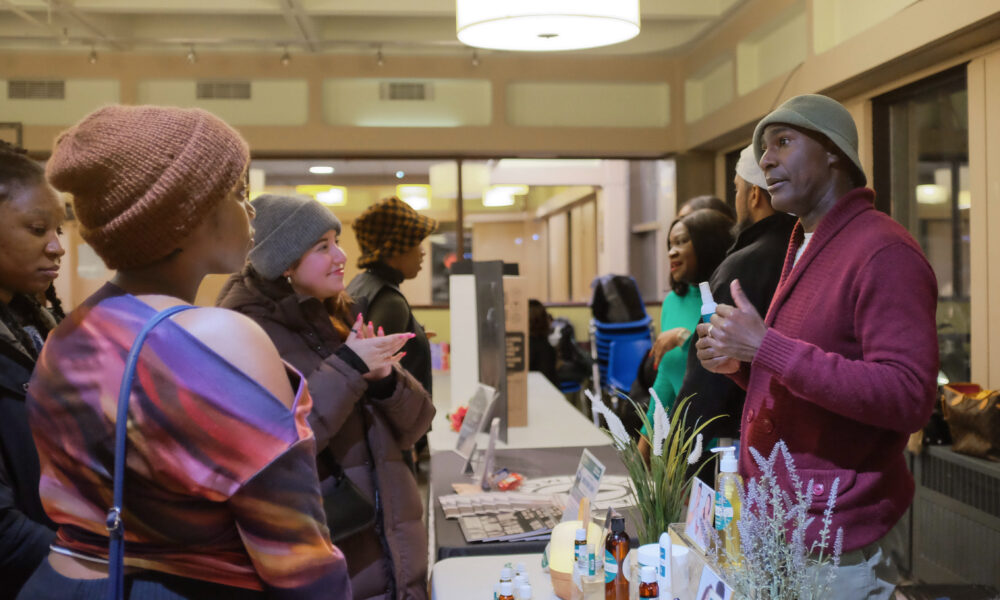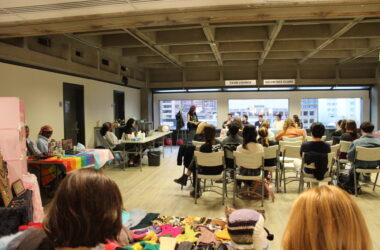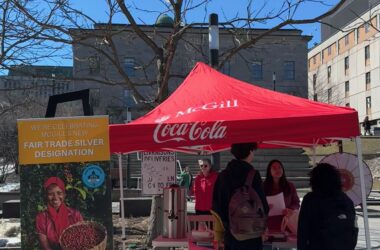Black History Month is a time to reflect on, honour, and uplift Black voices—but the work does not stop when March begins. This was the core message of Queer McGill’s Black History Month event, where attendees were encouraged to consider how they can support and celebrate Black communities every day of the year.
Held in the University Center on Feb. 18, the event featured a mini-market showcasing Black-owned businesses and artists, followed by a panel discussion with community leaders and activists. Panelists spoke on allyship, systemic issues, and the intersections of Black history and 2SLGBTQIA+ culture.
Panelist Joan Lee, president of the West Island Black Community Association, highlighted the importance of community attendance.
“When there’s events like this, people need to really come out and celebrate each other,” Lee shared. “Come to the event and learn: Learn about different ways of life, learn about different cultures.”
Panelist Lee-Anne Millaire Lafleur, owner of Caribbean restaurant Resto Palme and mother of three, further highlighted the need for collective responsibility, noting that conversations about systemic issues should not fall solely on the Black community.
“I have to have a conversation with my boys about [how they have to act when they] meet a police officer, [but] if we really want change […] everybody has to have that conversation with their sons,” she explained. “Our community has to know our history, […] but for the future, it can’t just be us [….] If my sons are out with other boys who aren’t Black, those boys need to understand that their actions could have consequences on my sons because of the system we live in.”
Jaqq Strapp, a performer and writer, noted the significance of Queer McGill’s event—not just because it celebrated Black History Month, but because a non-Black group organized it.
“Something about this event that I want to bring forth is the fact that those that organized it are not Black, and the fact that there was still intention to actually put together a Black History Month [event is] pretty significant,” he said. “What happens [often] in February is that everything gets dropped on the shoulders of Black people, and it can actually be, in all honesty, a very tiring month for us.”
Strapp asked the audience members to internalize a key question, encouraging attendees to reflect on their role in meaningful allyship: “How can I be more intentional with including and not tokenizing Black people 365, or 366 if there’s a leap day, days a year?”
Anushka Manoj, U3 Arts and one of Queer McGill’s Events Coordinators, acknowledged the historical lack of BIPOC representation within the organization.
“Historically, Queer McGill has been dominated by white people within the queer community who come from more privileged communities, so as women of colour, when [Valeria and I] got elected, our whole agenda for this year was to do more for marginalized communities […] at McGill,” she told The Tribune.
Valeria Muñoz, a Master’s student in Educational Leadership and another Events Coordinator for Queer McGill, echoed this sentiment in a statement to The Tribune.
“This is not a one-off thing—this is something deeply rooted in what we should all advocate for,” Muñoz wrote.
Manoj and Muñoz also planned a South Asian Pride Film Festival on Feb. 23, featuring four South Asian short films by queer filmmakers. Looking forward, they hope to continue sparking conversations about race, queerness, and activism beyond designated heritage months.
Queer McGill’s Black History Month event was more than a celebration—it was a call to action. By fostering conversations on activism, allyship, and intersectionality, the event emphasized that Black history and voices should be uplifted all year round, not just in February.







